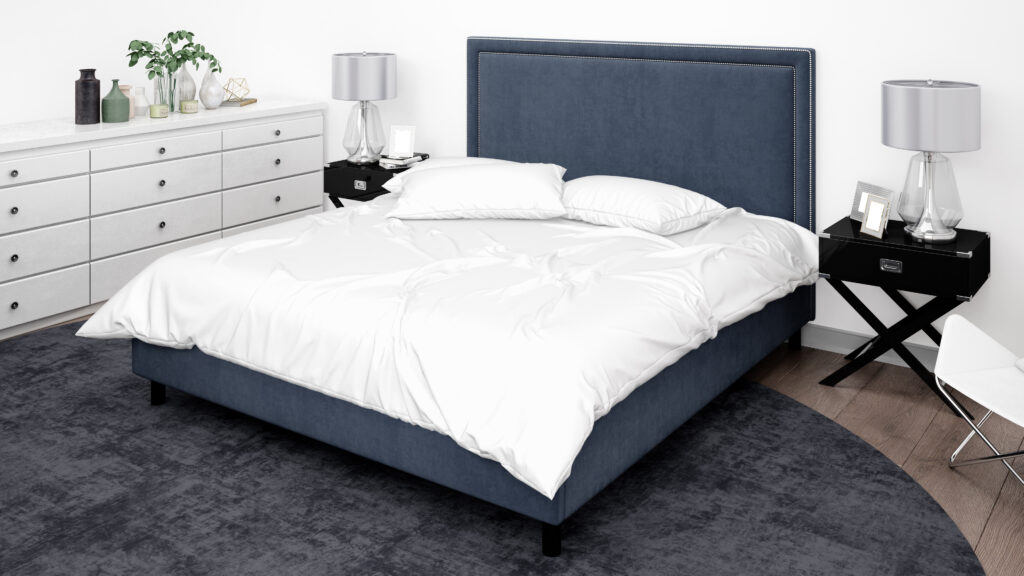Introduction
If you’ve ever shopped for bedding, you’ve likely come across the terms “Duvet vs. Comforter: Understanding the Difference” While both serve the same basic purpose – keeping you warm and cozy in bed – they are not one and the same. In this article, we’ll explore the differences between duvets and comforters, helping you make an informed decision about which one suits your needs best.

What Is a Duvet?
Duvet vs. Comforter: Understanding the Difference, A duvet is a type of bedding that typically consists of a soft, fabric shell filled with insulating materials. The fill can vary, but it’s often down, feathers, or synthetic fibers. Duvets are known for their lightweight and fluffy feel.
What Is a Comforter?
On the other hand, a comforter is another bedding option designed to keep you warm during the night. Comforters also have a fabric shell filled with insulating materials, and they come in various designs and thicknesses.
Key Differences
- Composition:
- Duvet: A duvet is typically a plain, soft, flat bag filled with down, feathers, or synthetic materials. It is designed to be inserted into a duvet cover.
- Comforter: A comforter is a thick, fluffy blanket that is usually filled with layers of synthetic fibers, down, feathers, or a combination of materials. it doesn’t require a separate cover.
- Design:
- Duvet: Duvets are plain and simple, meant to be covered with a decorative duvet cover that can be changed to match your bedroom decor or personal style.
- Comforter: Comforters come in various designs, patterns, and colors, so they can be used as the top layer of your bedding without the need for an additional cover.
- Construction:
- Duvet: A duvet is a soft, flat bag filled with down, feathers, synthetic fibers, or other materials. It’s designed to be inserted into a duvet cover, which is like a large pillowcase for your duvet.
- Comforter: A comforter is a thick, quilted, and often bulky blanket that is typically one piece. It has the insulating material sewn or quilted together, Comforters usually do not require a separate cover.
- Maintenance:
- Duvet: Duvet covers are washable and easier to clean, making duvets more practical for those who want an easily changeable and washable outer layer.
- Comforter: Duvet vs. Comforter: Understanding the Difference, Comforters can be more challenging to clean, as they are typically one piece and may not fit easily into a standard washing machine.
- Warmth:
- Duvet: Duvets are known for their insulating properties and can be very warm, especially if they contain natural down or feathers.
- Comforter: Comforters also provide warmth, but the level of warmth depends on the type and amount of filling used.
- Versatility:
- Duvet: Duvet vs. Comforter: Understanding the Difference, Duvets offer versatility as you can easily change the duvet cover to update the look of your bedding without replacing the entire duvet.
- Comforter: Comforters are less versatile in terms of design but are simple to use since they don’t require an additional cover.
- Appearance and Style:
- Duvet: Duvets offer more flexibility in terms of style. You can change the duvet cover to match your bedroom decor or change it with the seasons.
- Comforter: Comforters come in a fixed design and are usually chosen based on their appearance.

Choosing Between a Duvet vs. Comforter: Understanding the Difference
- Personal Preference: Do you prefer the versatility and easy maintenance of a duvet, or are you more drawn to the all-in-one design of a comforter?
- Climate Considerations: If you live in an area with fluctuating temperatures, a duvet may be the better choice due to its adaptability with different duvet covers.
Conclusion
Duvet vs. Comforter: Understanding the Difference In this debate, there’s no one-size-fits-all answer. Your decision should be based on your personal preferences, the climate you live in, and your maintenance preferences. Both duvets and comforters have their unique advantages, and the right choice is the one that provides you with the most comfortable and restful sleep.

FAQs:
FAQ 1: Can I use a duvet cover with a comforter?
Yes, you can use a duvet cover with a comforter, although it may not be as common. Duvet covers can add a decorative element and offer easy maintenance to comforters as well.
FAQ 2: Are duvets more suitable for certain climates?
Duvets are adaptable to various climates due to their interchangeable duvet covers. They can be used year-round, while comforters may be warmer and better suited for colder climates.
FAQ 3: Which one is easier to clean, a duvet or a comforter?
Duvets are generally easier to clean since their duvet covers protect the inner filling. Comforters, without removable covers, need more frequent washing.
FAQ 4: Do duvets and comforters come in different sizes?
Yes, both duvets and comforters come in various sizes, including twin, full, queen, and king, to accommodate different bed dimensions.
FAQ 5: Are duvets and comforters both suitable for all-year use?
Duvets can be used year-round, thanks to their customizable covers. Comforters are typically better suited for colder seasons but can be used in all-year conditions with the right cover selection.

4 thoughts on “Duvet vs. Comforter: Understanding the Difference”